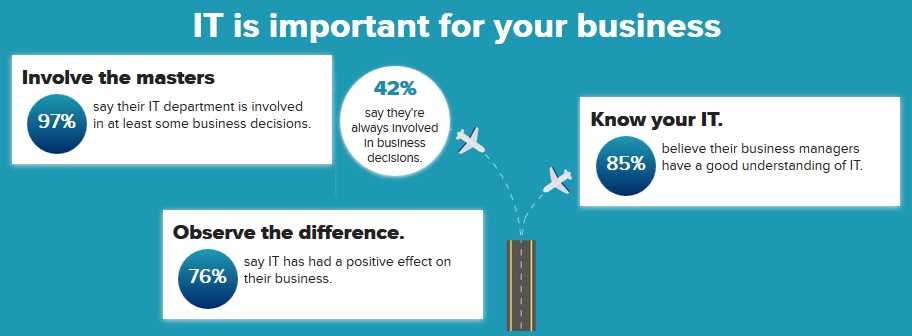

UK businesses have attained high levels of business-IT alignment in of all sizes, with IT pros demonstrating strong business understanding and business pros exhibiting strong IT knowledge to increase business performance, according to a new survey conducted by Censuswide for ManageEngine,.
"One of the cornerstones of business-IT alignment is shared objectives and vision," said Raj Sabhlok, President of ManageEngine. "This survey clearly shows that businesses in the UK have found a way to consistently get their IT and business managers on the same page and moving in the same direction. You can see this success in their high levels of cross-functional knowledge and in the positive impact that IT is having on the bottom line."
Key survey findings include:
■ 42 percent of respondents report their IT department is always or regularly involved in business decisions; a further 37 percent state their IT department is sometimes involved.
■ 85 percent of respondents believe their business managers have a good understanding of IT.
■ 84 percent of respondents note that their IT department reports to the board of directors or business owner with regular updates.
■ 76 percent of respondents reported that their IT has had a positive effect on their business' bottom line.
These findings suggest that there are healthy levels of alignment between IT teams and IT decision makers with their businesses as a whole. Those working within IT departments appear confident that they have both an understanding and an influence on the wider business, while those working outside the IT department feel that they have clarity on IT issues and their effects on the wider business.

IT Teams Adopt Stronger Cloud Role
■ 87 percent of companies in the UK have an enterprise cloud strategy; of those companies, 40 percent have a hybrid (mix of cloud and on-premises) policy while a further 26 percent have taken a public cloud approach. Just 21 percent of companies have taken a policy of using only a private cloud.
■ In terms of the impact of cloud usage on business processes, 70 percent of respondents indicated this has been positive.
■ 71 percent of companies plan to increase their spending on cloud computing during the next year.
These findings suggest that the adoption of cloud computing solutions is having a positive impact on businesses, with hybrid cloud policies emerging as the most popular within UK organisations. The high percentage of companies planning to increase spending on cloud computing is a further reflection of the positive impact that current cloud solutions have had on UK business.
Growing Need for Capable Security Tools
■ 48 percent of UK businesses believe they are somewhat or much more at risk from IT security attacks than they were 12 months ago.
■ 72 percent of respondents reported either cyber attacks, data theft by external parties, or unauthorised access and/or misuse of data by an employee.
■ 78 percent of IT decision makers reported providing staff with a mobile device to allow remote access to company data; approximately two-thirds of companies (64 percent) say their workforce uses or downloads apps not provided by the company for work.
■ Almost half of surveyed businesses (45 percent) reported that they "rarely," "never," or "only occasionally" install security updates and patches.
With a high number of businesses affected by security issues, it's no surprise that these findings reveal a dramatic increase in IT security concerns. However, it's likely that some of this increase comes from businesses that haven't experienced attacks but feel more at risk due to recent reports of widespread attacks on other businesses.
The findings also reveal issues in two areas: concerning levels of disregard for security protocols by using unauthorized apps on company-owned mobile devices and security patches not being kept up-to-date. Both are areas that, if treated as serious concerns, could drastically reduce the chances of a business experiencing IT security issues.
The Way Forward
■ 50 percent of IT decision makers say that IT and internet security are their top IT challenges for the next 12 months.
■ When asked to rank which three future technologies will have the biggest impact on business, 45 percent of respondents say that Internet of Everything (IOE) will have the biggest impact, followed by artificial intelligence (41 percent), and virtual and augmented reality (33 percent). Robotics and wearable technologies also both came in at around 20 percent.
■ When it comes to business confidence for achieving compliance with the EU's GDPR, 81 percent of respondents believe that they are prepared for the impending regulations.
While security patches and protocols over unauthorized apps have been revealed as two weak points in IT security, these findings suggest that businesses are beginning to take general IT security issues more seriously. While half of UK businesses highlight security as a top IT challenge for the next 12 months, a large proportion of businesses are still unfazed by IT security issues.
Surprisingly, GDPR compliance is seen to be much less of a challenge, with the vast majority of UK businesses stating that they are prepared for the regulations (which come into effect next May).
Methodology: Censuswide surveyed 201 IT decision makers about key issues facing line of business (LOB) managers, IT managers, IT directors, CIOs, and other IT decision makers in the UK.


